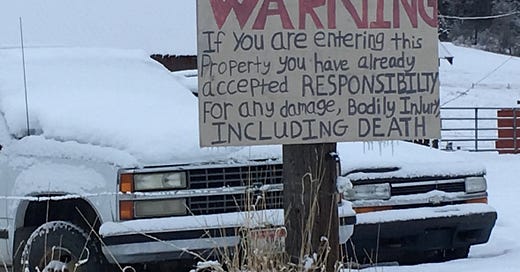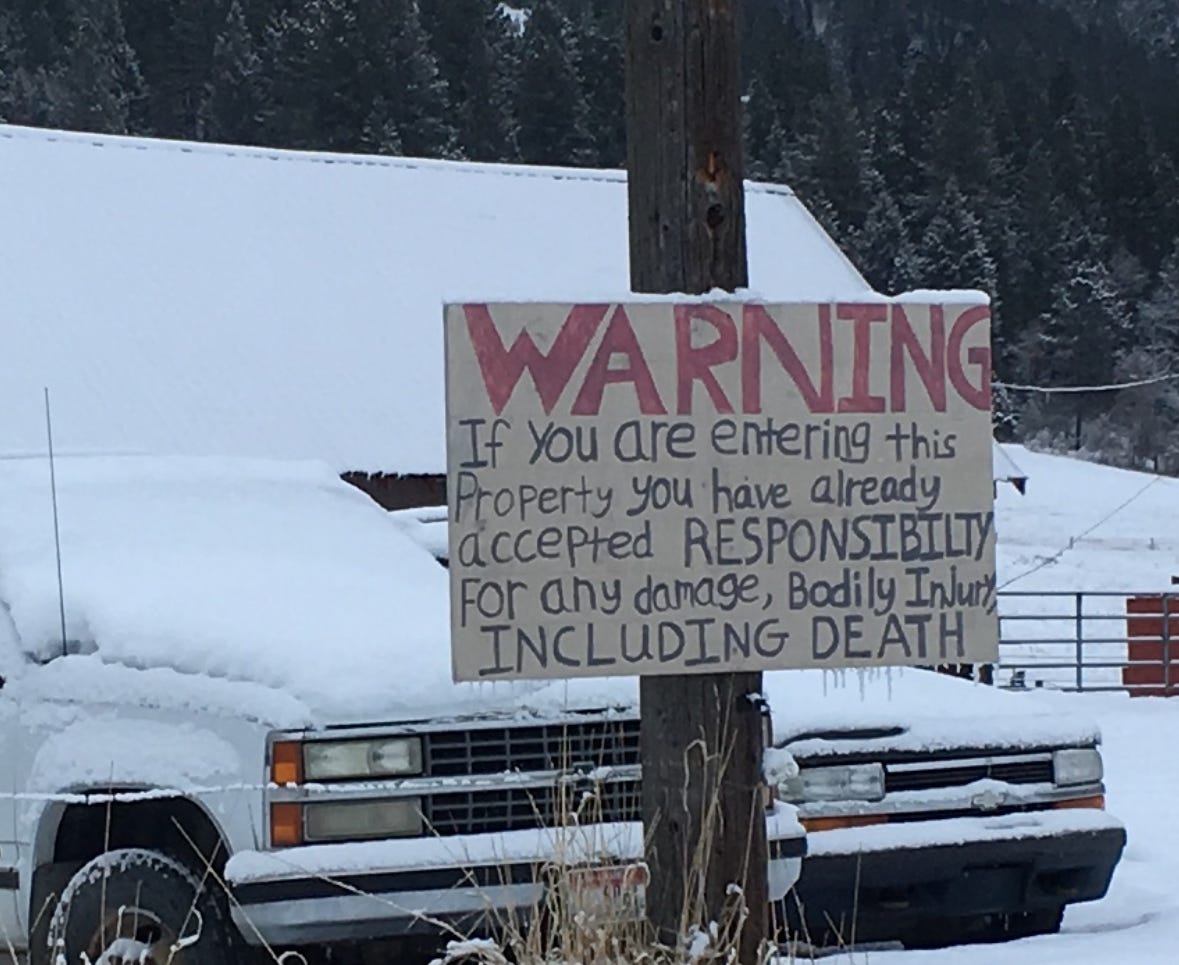I was sitting on the deck, belly out, and Ben was down in the front yard fixing the windmill he’d picked up in the free bin. It had fallen over again in the latest wind storm, and he was securing it with rope and rock. Walking up toward our house were four people we’d never seen before. Maybe they lived on the other side of the avalanche path. Maybe they lived in the bigger town 25 minutes north. It was one or the other, because we could hear them openly talking about some of our neighbors by name.
They pointed out one of the houses near us and named the owners, then started to talk about what they did for a living, how much their house cost, how much money they must make to afford that house, and as they speculated, they made no efforts to be quiet around the couple they didn’t know sunbathing and caretaking in their front yard. They even said hi. We said hi. And they kept talking.
There are 180 people in this town. Probably 75 or so on this side, 60 of whom I know personally. The other 15 are hermits or children. The likelihood of me knowing my direct neighbor is so high as to be a given. And here these people were, talking about them by name right in front of us.
I’m not sure at what point a town or a city has enough people to put your mind at ease about gossiping in public, but there’s one thing I know for sure: this place doesn’t.
People talking about other people is human nature. We all do it. We do it with every emotion and every intent. But here, in the valley of few, we do it very, very quietly.
A couple weeks back, I asked you what it meant to be a good neighbor.
And I outlined what a good neighbor looks like here, but I outlined what a good neighbor here looks like to me — starting with “driving slowly.”
Of course, not everyone here lists slow driving on their ideal neighbor profile because then they too would have to drive slowly. And people don’t. Residents even received an email from the town manager last week reprimanding them for their rampant speeding calling them selfish, callous, and self-absorbed for endangering their neighbors, pets, road workers, and wildlife.
Obviously I love this man.
The speed limit in town is 10 mph, and from town to the main highway, it’s 25. All of these roads are dirt. All of these roads are through wilderness areas. In the summer, roadkill is common: marmots, porcupines, rabbits, even deer. I can forgive a marmot, darting across the road whenever the spirit calls to them, but hitting a porcupine? Do you know how carelessly you have to be driving to hit a porcupine?
The best part of the whole speeding debacle though is that you know who is speeding. We can see them from our windows! We know every single car that every person here drives — not because we’re maniacal car trackers, but because there are so few people that knowing someone’s vehicle is like knowing their dog. Why wouldn’t you know?
In a town of 180, being a good neighbor is not an amorphous, hopeful thing. Instead, it’s tangible and constant reality. As my jackets get tighter and tighter, more and more neighbors are raising the flag of support. “Let us know if you need anything,” “call me if anything comes up,” “we’re just down the road if you need a hand.” This is the so-called village of childrearing. Of course, I’ll still need to actively ask for this support, and almost all of these people work so their availability is more likely “not” than “coming right now,” but still. Their intentions exist and that’s a welcome existence.
In the discussion on good neighbors, there were some common through-lines from apartment buildings to country dwellers about how to be a good neighbor:
We want to be acknowledged. Say hi! Give the 1-finger wave! Smile! This simple “I live here, you live here, let’s be friendly because we both live here” ethos was pervasive. Even some of the people who sought privacy above all else welcomed a nod, so long as it didn’t turn into a ten-minute driveway conversation about the latest community happenings.
Be helpful in a pinch. The ole cup’o’sugar rule. Can you bring in that package? Mind watering my plants? Could you make sure I turned my oven off? Would you be able to feed my cat? A number of people expressed that they might feel overwhelmed by being too close of friends with neighbors, but most people wanted a relationship where they could ask for help. Being able to be this neighbor is also very satisfying! Go ahead, take my ladder! Yes I’ll take your dog! Of course I’ll water your garden! What a delight to be of such simple use!
Do as they do unless what they do is bad. Neighborhoods, buildings, towns, dorms, etc. often have rules: how many washing machines you can use, how to dispose of your trash, where to park your cars, but they also have unwritten rules.
brought this up: “If other people can hear you or see you (or what you're doing/building/planting/tearing down), be considerate of what you are forcing other people to listen to or look at, and for how long.” One of the written rules here is that you must break down your cardboard boxes at the trash barn. We know who doesn’t! Because their names are on the boxes when Ben climbs into the dumpster to smash them down.
All of this really whittled down to “treat your neighbors like people.” Say hi, offer a hand, don’t be a jerk, don’t pretend they don’t exist, and don’t pretend you don’t exist.
In 2014, a study was published that made its way to pop culture about connecting with strangers. The findings of the study basically said we were happier when we connected with strangers than when we didn’t. Happier when we said hi to the person sitting next to us on the bus, happier when we acknowledged the other person in the waiting room, happier when we weren’t isolated in a busy room. And people guffawed. “Please don’t say hi to me on the subway,” was the resounding reply because we’ve become so accustomed to the people who do say hi being absolute weirdos — especially if you’re a woman.
But we’ve also isolated ourselves into a corner. Have you seen this ad? Putting aside that this is an ad for insurance, it’s an incredible reflection on current life. And this feeling is pervasive.
Apple had to recall their ad “Crush!” for its soulless attack on the humanities
Whitney Wolfe was laughed at for saying AI is the future of dating
This couple was eviscerated on social media for asking Outside Online how to talk to their weird neighbor less after moving to the middle of nowhere
Taking “neighborliness” online turns into rampant racism
Cashierless checkout doesn’t work
When we see examples of our lives becoming more digital and less connected, we recoil. It’s not the future we picture. But when we’re presented with the moment to introduce ourselves to our neighbors, many of us recoil even further.
New neighbors moved onto our block earlier this month. We knew a little about them in advance through general town knowledge, but not much, just that they were young with a dog. Could these be new friends? As we were driving back to our house from an appointment, we saw a woman walking along the road we’d never seen before. Ben pulled over to ask her if she was the new neighbor.
“Ha! No, I’ve been here a long time. Who are you guys?”
“Oh, funny! We just hadn’t seen you before, and we had some new neighbors move in, so I thought I’d ask. I’m Ben, this is Kelton.”
“Oh you bought Dick’s house! Everyone loves you guys.”
She went on to introduce herself, we knew her husband through town government and just hadn’t had the pleasure of meeting. She was jovial and funny and welcoming, and Ben and I were so elated to hear people liked us that we could barely contain ourselves. We waved our goodbyes, carried on with our drive, and not fifty feet down the road was another couple we’d never seen.
“Hey! Are you guys the new neighbors?”
They were, and now we were the old-timers yelling from our car, welcoming them to the neighborhood. Because that’s what you do here. You introduce yourselves, you say which house you’re in, and you offer yourselves up on the mantle of neighborliness.
Thinking about the group walking up our street speaking so loudly about our neighbors, I’m reminded that it’s a unique position to be in to live in a place where everyone is only 1 or 2 degrees apart — and what a responsibility it is. You can be the person who slips quietly into their home without saying hello to anyone, but you’ll also be known for doing so.
As the countdown begins on this baby, I’m double-checking the numbers in my phone to make sure I’ve got everyone I need for whatever I might need, whether it’s someone else to walk Jibs, a person to pick up groceries, a ride to the hospital, or just someone to keep an eye on the baby while I cry in the shower — and almost all of them are people I met on the dirt street, giving a side-eye to whoever didn’t slow down when they drove past.






One of the hardest things for me during our recent monthlong stay in our neighborhood in Istanbul was that people didn't much say hi to each other or even make eye-contact. It's not that their way was wrong -- just different! -- but as a guy who likes to be friendly and neighborly it actually got wearing...
I'm such a sap—the Amica ad brought tears to my eyes!
There are so many ways to live a contactless life, and maybe every now and then there's a good reason for it, but I feel like there is so much more joy to be had in participating with people in small ways (like accepting a package from a delivery person or having a nice exchange with someone at the register). It's those little things that build a better experience for people in our communities, and it costs us nothing to say hello and be friendly. It's possible that a two-second exchange of pleasantries could be the moment that makes someone else's day!